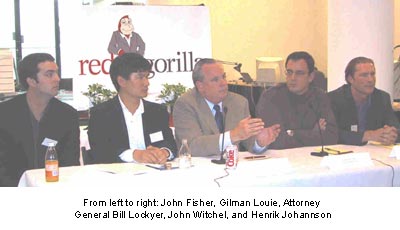E-Sign law goes into effect on October 1

By Douglas C. Morrison, Government Relations Manager, NetClerk, Inc.
On October 1st, the Electronic Signatures in Global and National Commerce Act (E-sign) will take effect. Unlike the Uniform Electronic Transaction Act, adopted last summer by the National Conference of Commissioners, E-Sign will mandate a single universal electronic signature law across the nation.
Until E-Sign, there were numerous state laws across the nation with regard to electronic signatures. This hampered Internet companies from efficiently conducting business on the web, which required them to conduct business with the traditional paper and pen. Recently in San Francisco, a group of Internet executives gathered to discuss the impact of this Federal legislation with California Attorney General Bill Lockyer.

Attorney General Lockyer spoke on a range of issues, from criticism of Republican Senator Trent Lott to his concerns about the strength of federal regulations on the Internet and how they will protect California citizens. Lockyer believes, however, that E-Sign will help commerce on the Internet by making citizens feel secure in conducting transactions. The group of Internet executives gathered to discuss the impact E-Sign also agreed.
Internet executives voice their views
Jon Fisher, CEO of NetClerk, pointed out E-Sign is not just for business-to-business transactions. NetClerk, the leader of web-based services for the contracting industry, is business-to-government company and currently interacts with over 750 municipalities across the nation. " This legislation will enable NetClerk to operate more efficiently, and will allow us to immediately conduct paperless transactions in a number of cities across the nation," said Fisher. His only question is how long it will take city and county governments to implement this new legislation.
John Witchel, CEO of Red Gorilla, thinks E-Sign will increase the over all confidence the consumer has using credit cards on the Internet. Witchel believes this in turn will increase the overall number of transactions on the Internet. "With the passage of this bill, our customers can now do business more confidently on the Internet," commented Witchel. Red Gorilla, which hosted the panel, syndicates web-based and wireless end-user applications to the Web 500 and other high-traffic web sites.
Henrik Johannson, Executive VP of Creditland.com, echoed Jon Fisher's concern on the timetable of implementation. Johannson thinks implementation will take sometime due to the overall size and complexity of the mortgage industry. However, once it takes hold he thinks the time and cost to receive a mortgage loan on line will be greatly reduced.
Gilman Louie, CEO of In-Q-Tel, believes the consumer's fears will diminish as biometrics, a form of electronic signature, become more commonplace. Biometrics currently includes fingerprints and retina identification, digitized signatures, and smart cards. In-Q-Tel is a non-profit corporation funded by the CIA.
About the author
Douglas C. Morrison, currently Government Relations Manager for NetClerk, Inc., has a Masters degree in Public Policy—Economics and International Relations from Pepperdine University. He also served as the Deputy Western Regional Director and as the Assistant to the National Political Director for the Quayle 2000 campaign. You may reach Mr. Morrison by e-mail at dmorrison@netclerk.com or by telephone at 650-624-0425. (Back to top)
